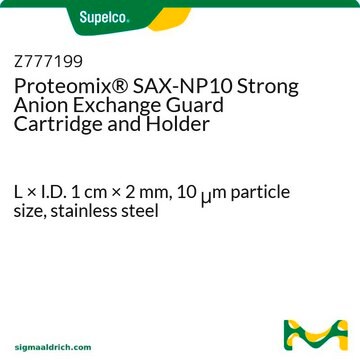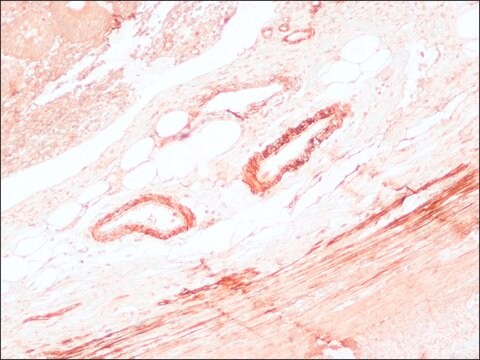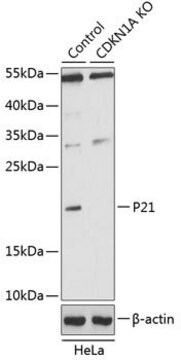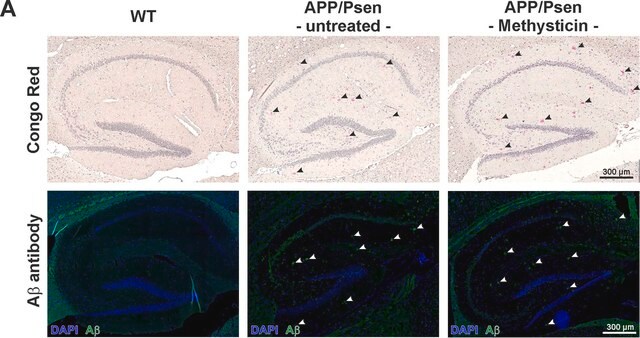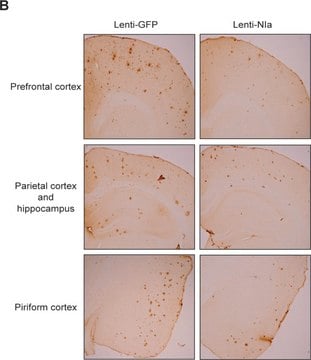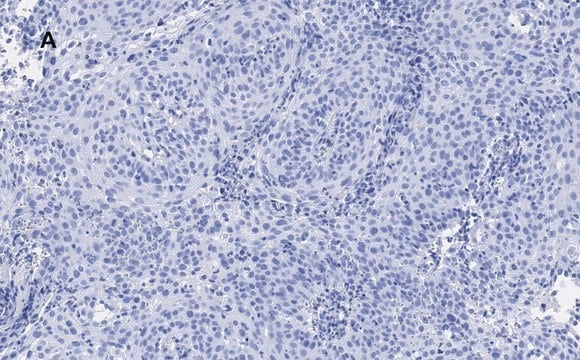일반 설명
We are committed to bringing you greener alternative products, which adhere to one or more of The 12 Principles of Green Chemistry.This antibody is Preservative-free, produced without the harm or sacrifice of animals and exceptionally stable to allow for ambient shipping and storage if needed and thus aligns with "Waste Prevention", "Designing Safer Chemicals" and "Design for Energy Efficiency".
Click here for more information.
ZooMAb antibodies represent an entirely new generation of recombinant monoclonal antibodies.
Each ZooMAb antibody is manufactured using our proprietary recombinant expression system, purified to homogeneity, and precisely dispensed to produce robust and highly reproducible lot-to-lot consistency. Only top-performing clones are released for use by researchers. Each antibody is validated for high specificity and affinity across multiple applications, including its most commonly used application. ZooMAb antibodies are reliably available and ready to ship when you need them.
특이성
Clone W0-2 is a ZooMAb® mouse recombinant monoclonal antibody that detects Amyloid β42/40. It targets an epitope within seven amino acids from the N-terminal region of Amyloid β peptide (corresponding to amino acids 672-678 of human amyloid precursor protein).
면역원
Linear peptide corresponding to seven amino acids from the N-terminal region of human Amyloid peptide β42/40.
애플리케이션
Quality Control Testing
Evaluated by Dot Blot Analysis with synthetic Amyloid β40 peptide.
Dot Blot Analysis (DB): A 1:10,000 dilution of this antibody detected synthetic Amyloid β40, fibrillar oligomer, and Aβ fibrils.
Tested Applications
Immunohistochemistry (Paraffin) Analysis: A 1:100 dilution from a representative lot detected Amyloid β42/40 in human cerebral cortex and human Alzheimer′s diseased brain tissue sections.
Immunofluorescence Analysis: A 1:100 dilution from a representative lot detected Amyloid β42/40 in human Alzheimer′s diseased brain tissue sections.
Note: Actual optimal working dilutions must be determined by end user as specimens, and experimental conditions may vary with the end user
Anti-Amyloid β42/40, clone W0-2 ZooMAb®, Cat. No. ZMS1045, is a recombinant Mouse monoclonal antibody that detects Amyloid b42 and 40 and is tested for use in Dot Blot, Immunofluorescence, and Immunohistochemistry (Paraffin).
표적 설명
Amyloid-beta A4 protein (UniProt: P05067; also known as ABPP, APPI, APP, Alzheimer disease amyloid protein, Amyloid precursor protein, Amyloid-beta precursor protein, Cerebral vascular amyloid peptide, CVAP, PreA4, Protease nexin-II, PN-II) is encoded by the APP (also known as A4, AD1) gene (Gene ID: 351) in human. Deposition of Aβ peptides is an early event in the pathogenesis of Alzheimer s disease (AD) that precedes the formation of Tau-positive paired helical filaments (PHFs) in NFTs. AD is also characterized by a progressive deposition of the Aβ peptide in senile plaques. Aβ peptides originate from the proteolytic cleavage of the amyloid precursor protein (APP). Processing of APP occurs by two major pathways cleavage of APP by a-secretase is a non-amyloidogenic pathway and does not produce Aβ peptides. Cleavage of APP at the N-terminus of the Aβ region by β-secretase and at the C-terminus by g-secretase represents the amyloidogenic pathway. The β-secretase cleaves APP between residues Met671 and Asp672 and yields sAPPβ and C99. Following the β-secretase cleavage, a second cleavage occurs at the C-terminus of Aβ peptide that releases Aβ from C99. This cleavage occurs in the vicinity of residue 712 of the C-terminus. The g-secretase can cleave the C-terminal region at either Val711 or Ile713 to produce the shorter Aβ peptide (Aβ1-40) or the longer Aβ peptide (Aβ1-42), respectively. The predominant form of Aβ found in the cerebrospinal fluid is the shorter Aβ1-40 peptide. Despite its lower rate of synthesis, Aβ1-42 is the peptide that is initially deposited within the extracellular plaques of AD patients. In addition, Aβ1-42 is more hydrophobic and aggregates at much lower concentration than the Aβ1-40 form. The abnormal accumulation of Aβ peptides can result in neuronal damage and loss by increasing free radical production and activation of inflammatory pathways by enhancing microglial secretion of inflammatory cytokines. Interaction between Aβ and ApoE3 or E4 is also an important determinant of amyloidosis. ApoE3 is shown to inhibit Aβ aggregation in vitro by decreasing Aβ multimers, whereas ApoE4 is reported to accelerate the rate of amyloid fibril formation. This ZooMAb® recombinant monoclonal antibody, generated by our propriety technology, offers significantly enhanced specificity, affinity, reproducibility, and stability over conventional monoclonals.
물리적 형태
Purified recombinant mouse monoclonal antibody IgG, lyophilized in PBS, 5% Trehalose, normal appearance a coarse or translucent resin. Contains no biocide or preservatives, such as azide, or any animal by-products. Larger pack sizes provided as multiples of 25 μL.
재구성
300 μg/mL after reconstitution at 25 μL per vial. Please refer to guidance on suggested starting dilutions and/or titers per application and sample type.
저장 및 안정성
Recommend storage of lyophilized product at 2-8°C; Before reconstitution, micro-centrifuge vials briefly to spin down material to bottom of the vial; Reconstitute each vial by adding 25 μL of filtered lab grade water or PBS; Reconstituted antibodies can be stored at 2-8°C, or -20°C for long term storage. Avoid repeated freeze-thaws.
법적 정보
ZooMAb is a registered trademark of Merck KGaA, Darmstadt, Germany
면책조항
Unless otherwise stated in our catalog or other company documentation accompanying the product(s), our products are intended for research use only and are not to be used for any other purpose, which includes but is not limited to, unauthorized commercial uses, in vitro diagnostic uses, ex vivo or in vivo therapeutic uses or any type of consumption or application to humans or animals.

